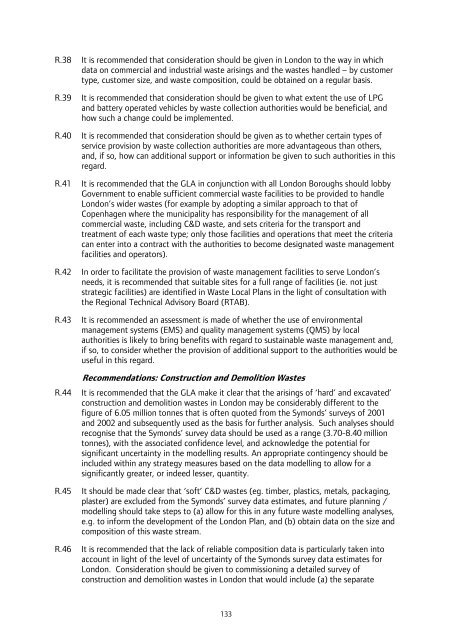London Wider Waste Strategy - London - Greater London Authority
London Wider Waste Strategy - London - Greater London Authority
London Wider Waste Strategy - London - Greater London Authority
Create successful ePaper yourself
Turn your PDF publications into a flip-book with our unique Google optimized e-Paper software.
R.38 It is recommended that consideration should be given in <strong>London</strong> to the way in which<br />
data on commercial and industrial waste arisings and the wastes handled – by customer<br />
type, customer size, and waste composition, could be obtained on a regular basis.<br />
R.39 It is recommended that consideration should be given to what extent the use of LPG<br />
and battery operated vehicles by waste collection authorities would be beneficial, and<br />
how such a change could be implemented.<br />
R.40 It is recommended that consideration should be given as to whether certain types of<br />
service provision by waste collection authorities are more advantageous than others,<br />
and, if so, how can additional support or information be given to such authorities in this<br />
regard.<br />
R.41 It is recommended that the GLA in conjunction with all <strong>London</strong> Boroughs should lobby<br />
Government to enable sufficient commercial waste facilities to be provided to handle<br />
<strong>London</strong>’s wider wastes (for example by adopting a similar approach to that of<br />
Copenhagen where the municipality has responsibility for the management of all<br />
commercial waste, including C&D waste, and sets criteria for the transport and<br />
treatment of each waste type; only those facilities and operations that meet the criteria<br />
can enter into a contract with the authorities to become designated waste management<br />
facilities and operators).<br />
R.42 In order to facilitate the provision of waste management facilities to serve <strong>London</strong>’s<br />
needs, it is recommended that suitable sites for a full range of facilities (ie. not just<br />
strategic facilities) are identified in <strong>Waste</strong> Local Plans in the light of consultation with<br />
the Regional Technical Advisory Board (RTAB).<br />
R.43 It is recommended an assessment is made of whether the use of environmental<br />
management systems (EMS) and quality management systems (QMS) by local<br />
authorities is likely to bring benefits with regard to sustainable waste management and,<br />
if so, to consider whether the provision of additional support to the authorities would be<br />
useful in this regard.<br />
Recommendations: Construction and Demolition <strong>Waste</strong>s<br />
R.44 It is recommended that the GLA make it clear that the arisings of ‘hard’ and excavated’<br />
construction and demolition wastes in <strong>London</strong> may be considerably different to the<br />
figure of 6.05 million tonnes that is often quoted from the Symonds’ surveys of 2001<br />
and 2002 and subsequently used as the basis for further analysis. Such analyses should<br />
recognise that the Symonds’ survey data should be used as a range (3.70-8.40 million<br />
tonnes), with the associated confidence level, and acknowledge the potential for<br />
significant uncertainty in the modelling results. An appropriate contingency should be<br />
included within any strategy measures based on the data modelling to allow for a<br />
significantly greater, or indeed lesser, quantity.<br />
R.45 It should be made clear that ‘soft’ C&D wastes (eg. timber, plastics, metals, packaging,<br />
plaster) are excluded from the Symonds’ survey data estimates, and future planning /<br />
modelling should take steps to (a) allow for this in any future waste modelling analyses,<br />
e.g. to inform the development of the <strong>London</strong> Plan, and (b) obtain data on the size and<br />
composition of this waste stream.<br />
R.46 It is recommended that the lack of reliable composition data is particularly taken into<br />
account in light of the level of uncertainty of the Symonds survey data estimates for<br />
<strong>London</strong>. Consideration should be given to commissioning a detailed survey of<br />
construction and demolition wastes in <strong>London</strong> that would include (a) the separate<br />
133
















